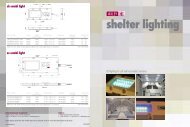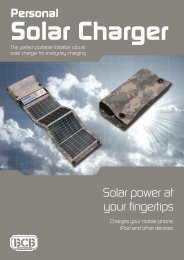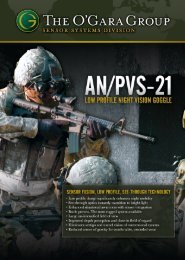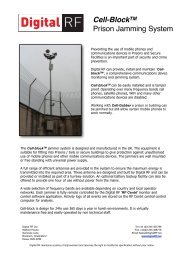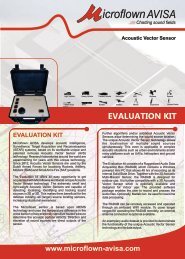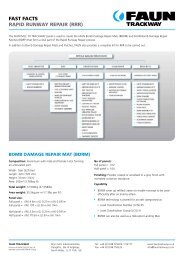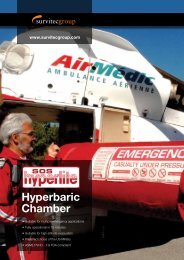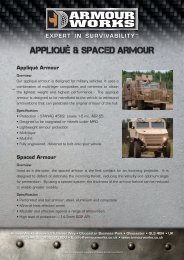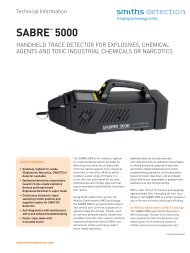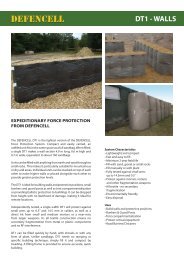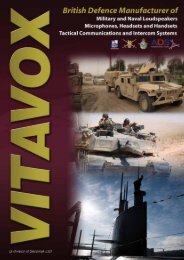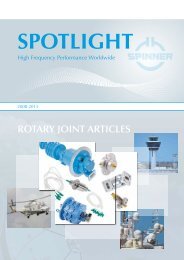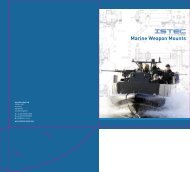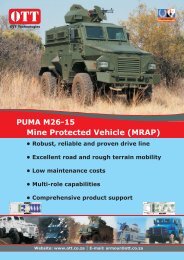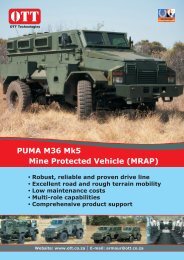Catalog 300 - Kaydon Bearings
Catalog 300 - Kaydon Bearings
Catalog 300 - Kaydon Bearings
Create successful ePaper yourself
Turn your PDF publications into a flip-book with our unique Google optimized e-Paper software.
REALI-SLIM ® <strong>Bearings</strong> <strong>Catalog</strong> <strong>300</strong> ©KAYDON ® Corporation Issue 10<br />
Torque Considerations<br />
Section 4–Separators, Balls, Performance<br />
Torque, as it applies to bearings, is defined as the<br />
moment required to turn the rotating race with<br />
respect to the stationary race.<br />
Usually the torque requirement of a ball bearing is only a<br />
small part of the demand of a mechanical system. In many<br />
REALI-SLIM ® bearing applications, however, masses and<br />
consequent inertias are slight and the amount of work<br />
being done is not great. In such cases, it may be important<br />
to know as accurately as possible how much turning effort<br />
must be provided.<br />
Many factors contribute to the resistance to rotation of<br />
a lightly loaded anti-friction bearing, and most of this<br />
resistance comes from the more unpredictable ones—<br />
separator drag; viscous drag of the lubricant; minute<br />
deviations from true geometry in the balls, race ways,<br />
and mounting surfaces of bearing, shaft, and housing;<br />
internal fit-up of the bearing; and the presence of<br />
contaminants.<br />
<strong>Bearings</strong> can be furnished to a maximum torque level<br />
specification.<br />
In the selection of the lubricant and lubricating system,<br />
their effects on torque should be kept in mind. To be<br />
considered are operating temperatures; speeds of<br />
rotation; type, viscosity and quantity of lubricant. All<br />
are major factors in determining lubricant drag. Please<br />
consult lubrication manufacturer.<br />
In tolerancing the shaft and housing it is important to<br />
set limits for out-of-roundness and out-of-flatness of<br />
the bearing seats. For normal requirements a good rule<br />
of thumb is to use the bearing radial and axial runout<br />
tolerances as the respective limits. For critical torque<br />
applications, closer tolerances should be specified since<br />
even a very small amount of localized internal preload<br />
(negative clearance) will create surprisingly large ball<br />
loads and consequent high torque. Where torque must<br />
be minimized it is important to limit out-of-roundness<br />
of housing or shaft to values which will insure against<br />
complete loss of internal clearance.<br />
Cleanliness is extremely important in maintaining<br />
uniformity of torque as well as a low level of torque.<br />
Very small amounts of microscopic particles of lint, dust,<br />
and other common contaminants can cause bearing<br />
torque to vary several hundred percent in just a few<br />
degrees of rotation. For this reason bearings should be<br />
kept in their original unopened package until time for<br />
installation. Every effort should be made to protect<br />
them from foreign matter, whether or not torque is<br />
critical.<br />
The accompanying charts show approximate torque<br />
levels of REALI-SLIM ® bearings under stated conditions.<br />
Estimates can be furnished for more unusual situations.<br />
Information submitted should contain all operating<br />
conditions of load, speed, lubricant, and environment<br />
including temperature together with a print of the<br />
intended mounting, showing materials and radial<br />
sections. If a limit has been set on permissible system<br />
error in terms of axis deviation—radial translation, axial<br />
translation, or angular rotation (page 102) — this<br />
information should also be submitted.<br />
Additional processing is used to achieve the lowest possible torque levels. High<br />
precision races and balls, super-finished ball tracks, and precisely set internal fit-ups<br />
assure optimum performance.<br />
• Low-torque ball separators<br />
• Clean-room assembly<br />
• Factory-lubricated bearings<br />
• ABMA Grade 10 balls<br />
• Super-finish ball track<br />
Materials<br />
Races AISI 52100 (Precision Class 6)<br />
Balls aISI 52100 (Grade 10)<br />
Cage (Type A) PTFE or Vespel ® toroid ball spacers<br />
Cage (Types C, X) Slugs<br />
100 | www.kaydonbearings.com 1-800-514-3066



